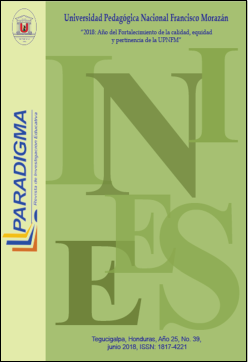Dietary habits, obesity and university life for nurse undergraduates
DOI:
https://doi.org/10.5377/paradigma.v25i39.6257Keywords:
diet habits, nursing students, nutritionAbstract
Health behavior of nursing students is often inadequate in terms of dietary, physical activity, smoking and alcohol drinking habits. The main aim of this position paper is to explore dietary habits, obesity and university life on nurse undergraduates. This critical review covers three distinct dimensions of student life as related to nursing studies, i.e. the eating and lifestyle behaviors of nursing students; the transitional period and risk of gain weight; students’ national origin and eating behaviors.
Obesity is increasing not only in the western world but in developing countries as well. University life is a transitional period where risk of weight gain is increased. Often, stress may lead students to ‘binge’ eating and weight problems. In terms of students’ national origin and eating behavior, dietary choices for nurse students are multifaceted, as their cultural backgrounds may be. Nurses, amongst other healthcare professionals, encounter barriers to positive lifestyles and healthy eating just as many of their patients do. Moreover, as healthcare professionals are regarded as potential health promoters, their own health behavior represents an important key clinical and educational function.
Yet, nutritional knowledge is not easy to apply as there is so much misinformation readily available both online and elsewhere.
Given the highly stressful conditions associated with their profession, nurses also need to care for their own health. Thus there is a need for designing educational programs for current nursing curricula to encourage healthy lifestyles which include coping with stress, increased physical activity, healthy food and drink choices.
Downloads
1288
Downloads
Published
How to Cite
Issue
Section
License
Transfer of Copyright
- The author, when sending the work, states that it is his will to give the Universidad Pedagógica Nacional Francisco Morazán the patrimonial rights that correspond to him as the author of his work.
- The rights here assigned include all economic rights (Reproduction, transformation, public communication and distribution) and are given without limitation in terms of territory; This Assignment is given for the entire duration term established in the current legislation in Honduras.
- The cession of the aforementioned rights does not imply the cession of moral rights over it, because in accordance with the provisions of the Copyright and Related Rights Law, Chapter II, of the Moral Rights, Article 34, Article 25 , these rights are inalienable, imprescriptible, indefeasible and inalienable.
- The research work or document must be original and have been done without violating or usurping rights of third parties, therefore, the work is exclusively authored and owns the same.
- In the case of any claim or action by a third party, as to copyright on the work in question, the author must assume full responsibility for the rights assigned.
- Upon completion of the Rights Assignment Form, the author states that the work has not been published in another way, that the rights on the work have not been assigned and that no encumbrance or limitation on their use or use is imposed on them.








